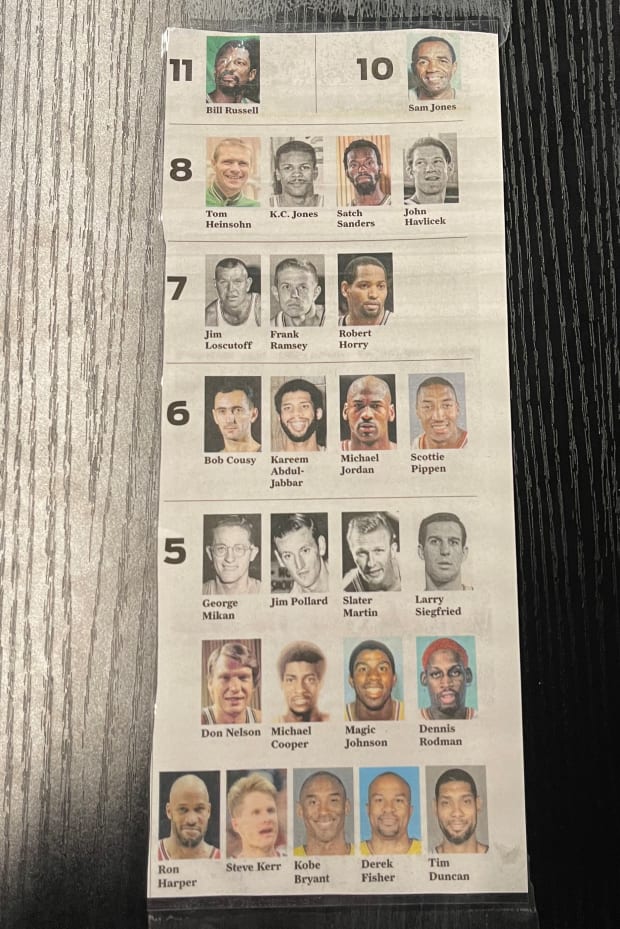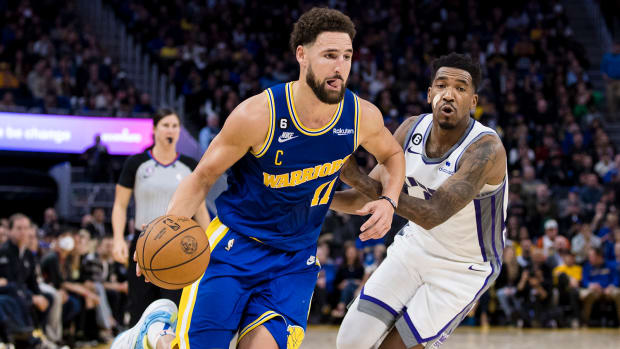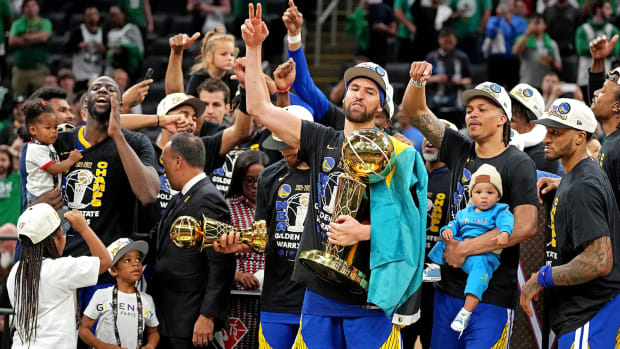On any given day of the Warriors’ season, Eric Housen might be booking flights and hotels, acquiring snacks, arranging team dinners and stocking every player’s locker with assorted jerseys and shoes and socks. As vice president of team operations, he’s tasked with countless critical details of a long NBA season—and the occasional random request.
And so, one afternoon in October, Housen set about clipping and laminating a large piece of newsprint, before carefully hanging it in the locker of one Klay Alexander Thompson. It was one of the quirkier asks Housen has fielded in his 30-plus years with the team. But then, Klay is one of the quirkier souls to have passed through this franchise.
“It’s probably one of the best requests,” Housen politely corrects.
The newsclip, torn from the San Francisco Chronicle, features 26 faces—some in color, some black-and-white, some smiling, some stoic—arranged in tiers. They now stare back at Thompson every night at Chase Center, silently reminding the four-time champion of everything he hasn’t done yet, of all that he still hopes to accomplish.
There’s Bill Russell at the top, and beneath him K.C. Jones and John Havlicek, who sit a tier above Robert Horry, who glances down at Kareem Abdul-Jabbar and Michael Jordan, who hover over a scrum of 13 others, including Magic Johnson, Kobe Bryant and Tim Duncan. They are the only men in NBA history with more rings than Thompson—from Russell (11) down through Horry (seven) and the Magic/Kobe tier (five).

Courtesy of the Warriors
The list was published in honor of the Warriors’ latest ring night, on Oct. 18. Thompson saw it and immediately asked Housen to do his best Kinko’s impression, so he could preserve the sense of awe.
“The Five Rings and Above Club,” Thompson says on a recent off-day. “I didn’t know the list was that small. And the players who played in the modern era? It’s even shorter. So it’s like, Wow, that’s the only motivation I really need.”
The sentiment was particularly resonant in late October, as the Warriors set out to defend their latest title, but might sound a bit delusional now, in late December, with the Warriors injured, disjointed and in general disarray. They’ve lost seven of their last nine games, and three of four since losing Stephen Curry to a shoulder injury. They went 1–5 on their just-completed trip through the East, capped by a ghastly 143–113 loss to the Nets on Wednesday, dropping their road record to a league-worst 3–16.
“Rock bottom,” coach Steve Kerr said after the loss in Brooklyn.
The veterans who bolstered the Warriors’ title run last spring—Gary Payton II, Otto Porter Jr. and Nemanja Bjelica—are gone. The youth they were counting on—Jonathan Kuminga, James Wiseman and Moses Moody—have mostly floundered. As of Friday morning, the Warriors sat 11th in the Western Conference.
By all rights, they should be fretting, fuming, perhaps even freaking out. This isn’t how an NBA dynasty, built around three future Hall of Famers, should be performing. But there’s something about being part of a living dynasty that seems to inure everyone in its orbit to panic or despair. (Also, thanks to a sudden burst of NBA parity, the Warriors are only 3½ games out of sixth place, and 6½ games out of first.)
Andrew Wiggins, out the last nine games due to a groin injury, is expected to rejoin the lineup soon. Same for key reserves Donte DiVincenzo and JaMychal Green, who missed the last two games of the road trip due to illness. But it could be weeks before Curry returns, and that stretch alone could conceivably sink the Warriors’ title defense.
And yet for those who have been on this entire journey—from the surprise title run in 2015 to the Finals collapse in 2016, from the back-to-back titles in the Kevin Durant era to the two-year malaise that followed, to the exhilarating revival last season—the current predicament is viewed as almost an inconvenience, a life lesson even.
“Every journey has to be different,” says Draymond Green. “That’s the beauty in it. No season is the same, even if you bring back every single person that you had the year before. It’s just not the same. It’s gonna be a different task, different journey. So, just got to embrace it, the good with the bad, and do what you can to make it right.”
Or, as Kerr puts it: “You just keep plugging away, you just keep going.”
“I think you learn as you go in this league, both as a player and as a coach … (that) there’s going to be stretches where you’re hot and you’re getting all the breaks and things are clicking and it feels like you can’t lose,” Kerr says. “And then there's stretches where you lose a bunch of games in a row, and it feels like the end of the world. And both of them are false.”
The Warriors’ vets implicitly understand this, because they’ve already been through the highest highs and the lowest lows this league has to offer. And none have lived that contrast more vividly than Thompson, who tore his ACL on the night the Warriors lost the 2019 championship to the Raptors, then tore his Achilles a year later.
Every game now feels like a gift—the wins ever more gratifying, the losses a little less devastating.

John Hefti/USA TODAY Sports
“I'm way more Zen,” Thompson says, bouncing a basketball on a hotel carpet. “I'm just appreciative of playing early in the season and being healthy and competing and feeling great. Not having a fear of injury. I mean, we want our record to be as best as it can be, but that can change. … You could change that circumstance. When I was hurt, you couldn't change a lot of things. So being able to actually do something about it—I got a whole new mindset of what I value and what not to care about.”
Thompson was, admittedly, not so Zen in the early weeks of the season, as he tried too hard to shoot his way back into a rhythm, forcing shots and occasionally derailing the offense. More than once, Kerr has had to urge patience and restraint. And more than once, Thompson lashed out at perceived signs of disrespect, whether coming from Suns star Devin Booker or TNT’s Charles Barkley.
Booker had taunted Thompson during a game early this season—eliciting a fiery retort, repeated references to his four rings, and eventually his first career ejection. That same night, Barkley suggested Thompson couldn’t regain his All-Star form, due to age and injury, prompting Thompson to clap back in a press conference.
“Yeah, man, I’m mad I even addressed that,” Thompson says now. “It’s like, only time will tell. I just gotta hoop and let the talkers talk. Like, what else do I got to prove, man? At this point, it’s all gravy, playing with house money.”
In the weeks that followed, Thompson found his legs and his rhythm and let his game do the talking. Over a 10-game stretch from mid-November to mid-December, he averaged 23.5 points, while making 45 percent of his three-pointers, looking once again like one of the most feared long-distance snipers in NBA history. The highlight? A 41-point outburst to beat the Rockets, including 10 three-pointers (on 13 attempts). It was his sixth career game with at least 10 threes, and his first since January 2019.
“That game in Houston helped me a lot,” he says. “I was kind of pressing up to that point. But when you make 10 threes, that does things for you. It’s just, Oh wow, I can still do it. I still got it. … I'm in way better shape than I was even a month ago. I'm feeling like myself again.”
Three weeks later, Thompson turned in a vintage defensive effort in a victory over the Celtics, helping limit star Jayson Tatum to just 18 points. These are the moments that remind the world how indispensable Thompson was in this dynasty’s rise—and how vital he still is when he’s at his peak.
“Klay actually just needs to do what he's always done, which is just be a great two-way player,” Kerr says. “Take good shots and move the ball, and the defense is all over you. And then guard one of the best players on the other end. And if he does that, and everybody else is playing their roles, then we’re going to win some games and we’re going to be in good shape.”
But those peak performances still come and go, a reminder that for all the recent throwback moments, Thompson is older now and is still working his way back from two serious injuries and that 2½-year absence. The Warriors still monitor his minutes, and still rest him on the second night of back-to-backs. He’s struggled again recently, especially without Curry at his side.
For all his bravado, Thompson knows this comeback is an ongoing process, and he’s highly appreciative when a reporter cites his defensive tenacity in that Boston game. “Oh man, appreciate that,” he says.

Kyle Terada/USA TODAY Sports
Back in June, with the Warriors on the verge of the championship, Thompson allowed himself a moment of unbridled optimism, predicting he’d be an All-Star again soon—a proclamation that elicits a warm laugh when it’s read back to him. “Oh man, biiiig talk,” he says with a smile, though he’s quick to reiterate the goal.
“I’m gonna do it again, at least one more time before I’m done,” he says, tugging at the black rubber wristband on his right arm—a memento from the New York All-Star Game in 2018. That the All-Star MVP trophy is now named for Bryant, one of Thompson’s biggest idols, just adds to his motivation. “I’d love to shoot for that,” he says.
But nothing drives Thompson like the thought of a fifth title, of joining that elite club hanging in his locker. The group includes Kerr (who won three with the Bulls and two more with the Spurs) and several of Thompson’s childhood idols, from Magic and Michael Cooper to Jordan, Scottie Pippen and Dennis Rodman, to Bryant, Horry and Derek Fisher. And yes, as Thompson notes, most of the players on the list won their rings when the league was in its infancy. Only 12 of the 26 played in the 1980s or later.
“It's just so cool to look at every day,” Thompson says. “On the days you don't feel like doing what you're supposed to do, that gets me through it.”
He thinks about the Sunday afternoons he spent as a kid, watching the Showtime Lakers (including his father, Mychal), and later the Bulls and the Shaq-Kobe Lakers, “and that NBC song came on. It was like the best memories of my childhood. And that's what motivates me, is just to be able to be on the minds of basketball fans for such a long time, because of the success we've been able to have.”
Over time, you can see multiple-time champions grow either contented or greedy. “Klay is definitely in the latter group,” Kerr says. “I think he's sort of driven by a feeling of disrespect and wanting more, wanting to keep proving people wrong.”
Even with four rings, five All-Star Games, two All-NBA nods and an All-Defensive team appearance, Thompson feels forever slighted. He’s certain he should have made a few more All-Defensive teams. He’s still irked about being left off the NBA’s 75th anniversary team. More trophies means more respect. “Klay takes great pride in winning,” Kerr says, “and I think he takes the most pride in being a two-way player. I know that it's bothered him in the past when guys he didn't consider two-way guys were ranked ahead of him.”
Kerr loves that Thompson cares so much about his place in history, and yet, paradoxically, he wants him to stop listening to all the people who discuss such things.
“My goal, really, this year has been to help him relax and play, and try to avoid all the noise,” Kerr says. “But it's really hard in today's world to avoid all the judgment and criticism. … It's brutal, what he's been through. He loves the game so much. He wants so badly to be back on top.”
Every championship has meant something different. The first, Thompson says, was “pure elation.” The second? “Dominant. Almost like a formality.” Then the Warriors won back-to-back, a rare feat and “insanely amazing,” like the winning would never end. A year later, it all seemed to. Durant went down. Thompson went down. Durant left. No one expected them to win the fourth title, until they did. “Crazy,” Thompson says. “Because, almost like the first one, it was so unexpected.”
A fifth seems further off now than the fourth did at this time last year. But these Warriors have a way of reinventing and reviving themselves, and finding new ways to surprise us all.
So they’ll try to regroup once more in the weeks to come, with the confidence Curry will be back soon, and with the comfort of playing their next eight games at home in San Francisco, where Thompson will be greeted by those 26 faces, daring him to keep up the chase.







